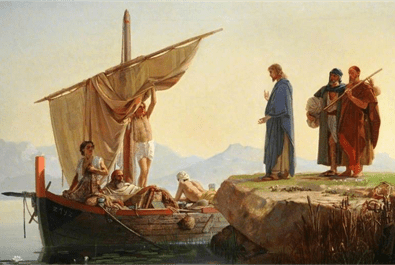Reflection from Pope Francis on today’s Gospel:
This Sunday’s Gospel passage (cf. Mk 1:14-20) shows us, so to speak, the “passing of the baton” from John the Baptist to Jesus. John was His precursor; he prepared the terrain for Him and he prepared the way for Him: Jesus can now begin his mission and announce the salvation by now present; He was the salvation. His preaching is summarized in these words: “The time is fulfilled, and the kingdom of God is at hand; repent, and believe in the gospel” (v. 15). Simply. Jesus did not mince words. It is a message that invites us to reflect on two essential themes: time and conversion.
In this text of Mark the Evangelist, time is to be understood as the duration of the history of salvation worked by God; therefore, the time “fulfilled” is that in which this salvific action reaches its pinnacle, full realization: it is the historical moment in which God sent his Son into the world and his Kingdom was rendered more “close” than ever. The time of salvation was fulfilled because Jesus arrived. However, salvation is not automatic; salvation is a gift of love and as such, it is offered to human freedom. Always, when we speak of love, we speak of freedom: love without freedom is not love; it may be interest, it may be fear, many things, but love is always free, and being free it calls for a freely given response: it calls for our conversion. Thus, it means changing mentality — this is conversion, changing mentality — and changing life: no longer following the examples of the world but those of God, who is Jesus; following Jesus; “doing” as Jesus had done, and as Jesus taught us. It is a decisive change of view and attitude. In fact, sin — above all the sin of worldliness which is like air, it permeates everything — brought about a mentality that tends toward the affirmation of oneself against others and against God. This is curious… What is your identity? And so often we hear that one’s identity is expressed in terms of “opposition”. It is difficult to express one’s identity in the worldly spirit, in positive terms and in those of salvation: it is against oneself, against others and against God. And for this purpose it does not hesitate — the mentality of sin, the worldly mentality — to use deceit and violence. Deceit and violence. We see what happens with deceit and violence: greed, desire for power and not service, war, exploitation of people… This is the mentality of deceit that definitely has its origins in the father of deceit, the great pretender, the devil. He is the father of lies, as Jesus defines him.
All this is opposed by the message of Jesus, who invites us to recognize ourselves as in need of God and his grace; to have a balanced attitude with regard to earthly goods; to be welcoming and humble toward everyone; to know and fulfil ourselves in the encounter with and service of others. For each one of us the time in which we are able to receive redemption is brief: it is the duration of our life in this world. It is brief. Perhaps it seems long… I remember that I went to administer the Sacraments, the Anointing of the Sick, to a very good elderly man, very good, and in that moment, before receiving the Eucharist and the Anointing of the Sick, he said this phrase to me: “My life flew by”. This is how we, the elderly, feel, that life has passed away. It passes away. And life is a gift of God’s infinite love, but it is also the time to prove our love for him. For this reason every moment, every instant of our existence is precious time to love God and to love our neighbour, and thereby enter into eternal life.
The history of our life has two rhythms: one, measurable, made of hours, days, years; the other, composed of the seasons of our development: birth, childhood, adolescence, maturity, old age, death. Every period, every phase has its own value, and can be a privileged moment of encounter with the Lord. Faith helps us to discover the spiritual significance of these periods: each one of them contains a particular call of the Lord, to which we can give a positive or negative response. In the Gospel we see how Simon, Andrew, James and John responded: they were mature men; they had their work as fishermen, they had their family life… Yet, when Jesus passed and called to them, “immediately they left their nets and followed him” (Mk 1:18).
Dear brothers and sisters, let us be attentive and not let Jesus pass by without welcoming him. Saint Augustine said “I am afraid of God when he passes by”. Afraid of what? Of not recognizing him, of not seeing him, not welcoming him.
May the Virgin Mary help us live each day, each moment as the time of salvation, when the Lord passes and calls us to follow him, each according to his or her life. And may she help us to convert from the mentality of the world, that of worldly reveries that are fireworks, to that of love and service.
(Angelus Address 1/24/21)

